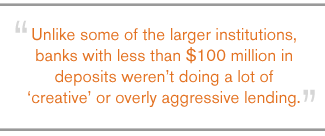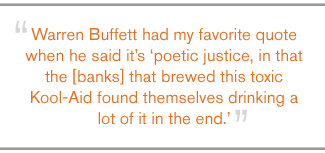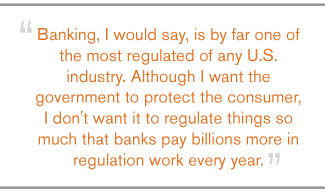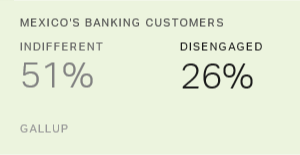In January, Citigroup Inc. announced a fourth-quarter net loss of $9.83 billion, and its CEO slashed 4,200 jobs -- and plans more cuts. In March, Federal Reserve Chairman Ben Bernanke orchestrated the sale of investment bank Bear Stearns, following what amounted to be a run on the bank, to banking giant JP Morgan Chase. Bank of America has agreed to purchase Countrywide Home Loans amid analyst concerns that its CEO is potentially trading long-term profits against a short-term $6.5 billion hit on the company's balance sheet. And in April, UBS announced an additional $19 billion in write-downs on U.S. real estate and related credit positions. It seems as if the toxin released by the subprime mortgage debacle is still spreading, and there's not a bank left that isn't suffering from the poison.
 |
Not so, says Douglas Berlon, Gallup's global practice leader for financial services. Some banks aren't suffering as much because they have been more prudent in their lending activity and have partnered with customers to promote sound financial judgment. Furthermore, most of the bigger banks were cushioned with steady deposit growth and good liquidity positions before the meltdown and subsequently have sufficient cash to protect the organization. What banks need to do now, says Berlon, is return to their conservative roots.
In this interview, Berlon -- whose 20-year banking career ranges from serving as a branch leader to a top executive for a major financial institution -- discusses the effect of the subprime meltdown on the financial services industry and the effect it will have on consumers. He also argues that the Hope Now Alliance and the federal stimulus package alone can't accomplish what banks must do for themselves -- manage better, lend better, and never forget what led to the crisis of 2007.
GMJ: It seems as if each day brings another new story about the effect of the subprime mortgage mess on another large U.S. bank. But what about smaller institutions? What effect has the subprime meltdown had on them?
Berlon: Unlike some of the larger institutions, banks with less than $100 million in deposits weren't doing a lot "creative" or overly aggressive lending. Their processes stayed pretty close to normal credit standards and products. Having said that, some of the smaller banks were probably not as diligent about watching their credit as they had been in the past because their delinquency rates had gone so low. Delinquency rates had dropped to the point where banks felt they could lend a little bit outside their credit targets because people were generally paying back their loans -- and since those loans were secured by real estate, what could possibly go wrong? Unfortunately, events in the last several months have shown us that things could go wrong -- and did.
Although the bigger banks certainly took a harder hit, they also were more likely to have the capacity to absorb that hit. In the fourth quarter of 2007, the 50 largest U.S. banks added $31 billion in charges related to asset write-down, restructuring, and related activities. But banks collectively lost only $3 billion. They took $31 billion out of their profit, but they only lost $3 billion, which means that overall, these banks were able to sustain their losses. Now, if the losses continue, it will be a nightmare, and my guess is that there will be some additional write-downs. But in my experience, the small banks weren't as exposed; they've written their losses off, taken a more conservative credit posture, and are in pretty good shape going forward.
There are currently about 8,600 banks and savings institutions in the United States; in 2000, there were 10,000, and my guess is that eight years from now, there will be about 7,200. The top five banks of the top 150 banks and thrifts now account for about half the assets in the market. Because small banks don't have the same exposure [to the subprime market] as the bigger banks, they have less risk exposure.
GMJ: Consumers are finding it a whole lot harder to get credit. What effect will that have on lending institutions?
Berlon: The reason some people are having a harder time getting credit is because lending institutions are returning to what I would consider more standard lending underwriting guidelines. I think that when the money is flowing freely, it's easy to become a little loose on standards. But as a bank starts taking some losses, standards become a big deal.
So banks are clamping down, though they know they're eliminating some business opportunity. And the perception, as you see in Gallup's recent polls, is that consumers can't get credit. [See "Consumer Credit Crunch Intensifies" and "Consumer Credit Perceptions Plunge" in the "See Also" area on this page.] That's not necessarily true. In my experience, if you have good credit and you have the ability to repay, you can get credit.
GMJ: Just like it was ten years ago.
 |
Berlon: Yes, exactly. And honestly, my personal opinion is, that's a good thing. Getting back to standards is better for consumers. A creative lending technique, such as a forty-year interest-only amortization, sounded good a couple years ago, but it costs consumers much more than a traditional amortizing loan. Also, banks are being more careful about lending money to people who can't afford to repay it, and ultimately, I think that's good.
Warren Buffett had my favorite quote when he said it's "poetic justice, in that the [banks] that brewed this toxic Kool-Aid found themselves drinking a lot of it in the end." It's a more bitter experience for consumers than for banks because the people who borrowed too much are suffering. But those who didn't are mostly fine. There's still money available for people who have taken care of their credit -- and banks that are willing to lend to them.
In the coming year, we're going to hear more stories of people who are unable to get credit, which they might have gotten easily last year. But the bottom line is that due to the looser lending standards, they maybe shouldn't have gotten it at all.
GMJ: In other words, banks used to lend like your tight-fisted dad, but lately they've been lending like your crazy cousin. But you're saying they're pulling themselves together?
Berlon: That's exactly right. When I was lending, I had a fiduciary responsibility -- I would tell people, "Technically you can afford this, but lending you this money is just not in your long-term financial interest. Go to credit counseling, get your credit straightened out, and then we'll talk about it." That's responsible lending.
What got us in this mess is not just irresponsible lending, but creative lending. Banking isn't complicated. People give you their money, and then you lend it out to other people. Hopefully you make a spread in between. For example, the spread is the difference in the rate banks pay on deposits gathered and the rate banks earn on loans. So if a bank pays 2% on the deposit and loans it at 5%, the spread is 3%. Once you start adding all these exotic variances, things get complicated -- and lending becomes risky both for lenders and consumers.
GMJ: What do you think of the Hope Now Alliance -- the thirty-plus lending institutions that have allied with credit counselors, loan services, investors, and others to help homeowners facing foreclosure?
Berlon: I think it's a constructive move. I'm glad they are doing it, and it's probably a good PR thing. It actually helps people feel a little more comfortable, and it might even help those banks out.
As a banker, the last thing I ever want to do is take back the collateral that I've lent money on because it's bad for the customer, and the bank loses money on it immediately. For example, as soon as I foreclose on a house, I'll lose twenty percent on it because by the time the house is returned to me, I've got to fix it up, I've got to get it on the market, I've got to pay real estate fees, it'll take a while to sell -- the list goes on and on.
So it's great that banks have formed this alliance, and it's great that they're making a public show of it, and it might help some people a little bit. The problem is that if banks help the customers who shouldn't be in those loans anyway, they're only postponing the inevitable; a year from now, those customers will be in the same situation.
GMJ: So the Alliance is just delaying the inevitable?
Berlon: That's what I suspect. There are two schools of thought about that. Ripping the Band-Aid off hurts, yes, but sometimes that's better. I like that banks are out there proactively helping. I hope that the customers who can benefit from the Alliance do. But if the banks are doing it for the folks who they shouldn't have lent to in the first place, or if they're doing it to cover their assets and hoping that something's going to get better, I'm probably not as excited about that.
GMJ: What do you think the federal economic stimulus package will mean for banks?
Berlon: Nothing.
 |
GMJ: You don't see it helping banks?
Berlon: I can't think of a situation where this little bit of money will do much good. I just can't see how giving the population between $300 and $1,200 makes any difference. [See "Stimulus Payments - What You Need to Know" in the "See Also" area on this page.] If you are prone to spending all your money, you will still spend all your money -- and after that $1,200 is gone, it's gone, and you've still got to figure out what to do next month. God forbid somebody goes and buys a car based on this money or takes on some other kind of long-term debt. I do agree that if people spend the money, it will stimulate the economy. But I'm not sure people are willing to spend it.
GMJ: Is it possible for banks to regulate themselves so that problems like the subprime fiasco never happen again? Or will it take congressional legislation?
Berlon: Banking, I would say, is by far one of the most regulated of any U.S. industry. Although I understand the concept that regulation could help prevent this situation in the future, the reality is that implementing those regulations at 8,500 organizations across the country is problematic, and I don't think the regulations would be cleanly implemented across the affected organizations. So, although I want the government to protect the consumer, I don't want it to regulate things so much that banks pay billions more in regulation work every year.
What banks need is better institutional memory. A good example is Société Générale, the bank in France that lost 4.9 billion Euros through the actions of a rogue trader. It won't have that problem again soon. As long as banks remember what the current difficulties cost them, they'll be more careful in the future.
GMJ: With foreclosures on the books and a recession in the wings, what can banks do to dig themselves out?
Berlon: If banks can help their customers wade through this tough time, then that will make a huge difference. If banks start suddenly foreclosing on their customers, the situation will get worse and worse. If they can stave off the foreclosures when there's a good likelihood that those customers could get back on their feet -- that would make a big difference too.
If banks have learned their lessons -- if they aren't overpaying on interest, they are making sure they price their loans appropriately, they're making sure each customer's credit is okay, and they're clamping down on the loan underwriting -- it will almost be "business as usual" very soon. If the fringe lending is curtailed, the losses will be smaller. And banks will be able to right their own ships. Above all, they must make sure that employees and customers are engaged and looking out for each other's best interest.
But the bottom line is, customers still need loans, and businesses still need to expand. Banks just have to make sure they have the right people doing the work and that customers can afford the money they borrow. It's really pretty simple. But so is banking.
-- Interviewed by Jennifer Robison

